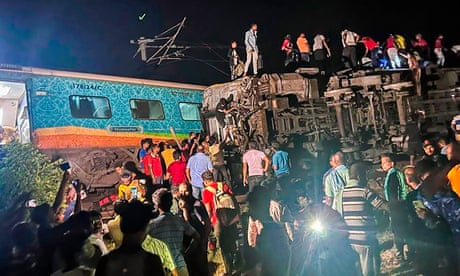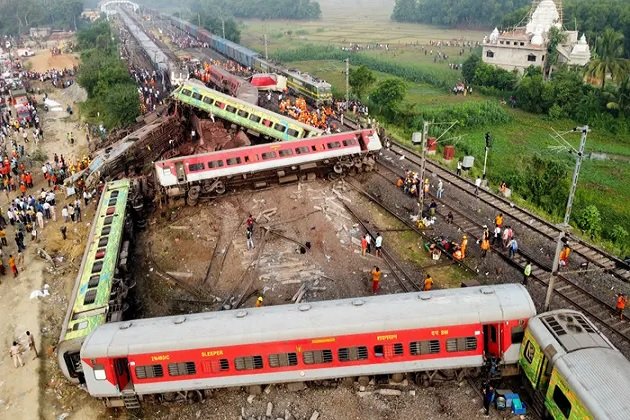‘Wailing for help’: passengers and bystanders tell of India train crash horror
The carriages from three trains sat piled high in an entangled wreck. Some lay sideways, while others had been thrown so high into the air on impact that they had fallen back to earth twisted and upside down.
A line of dozens of bodies covered in white sheets were laid out next to the wreckage waiting for vehicles – ambulances, local cars, even tractors – to take them away to local hospitals. Passengers’ possessions lay scattered around them, shoes and toys and thrown-open suitcases.

This was the aftermath of the deadliest train crash in India in more than two decades, when on Friday evening the Coromandel Express, which runs from Kolkata in West Bengal to Chennai in Tamil Nadu, switched rails and collided with a freight train in the eastern state of Odisha close to Bahanagar Bazar station, while travelling at around 80mph (130km/h).
The freight train in turn derailed some carriages of the Howrah Superfast Express train, which was travelling in the opposite direction. More than 2,000 passengers were aboard both trains.
Thousands took part in the rescue operation, which saw the National Disaster Response Force, state government teams, the air force, fire department personnel, police officers and sniffer dogs brought in to pull survivors from the chaos of twisted metal and broken glass, working in sweltering heat.
As the rescue operation drew to a close on Saturday evening, the death toll stood at 288, with 803 injured, according to a railway authority statement.
The prime minister, Narendra Modi, declared that Saturday was a day of mourning for the country and that compensation of £10,000 would be given for each of those who died.
Modi flew to the the site on Saturday afternoon and met the injured in hospitals, stating afterwards that “words can’t capture my deep sorrow”. He vowed that “those found guilty will be severely punished”.
The railway minister, Ashwini Vaishnaw, who was facing calls for his resignation, had surveyed the wreckage earlier in the day and promised a high-level investigation, including into whether a signalling failure had caused the crash.
World leaders including the UK prime minister, Rishi Sunak, the Russian president, Vladimir Putin, and the Chinese president, Xi Jinping, were among those who offered their condolences over the incident.
In a tweet, Sunak said his “thoughts and prayers were with Narendra Modi and all those affected by the tragic events in Odisha”.
Relatives of those on board the trains rushed to the site and began frantically looking through the bodies trying to find their loved ones. Among them was Rabindra Shau, 53, who was looking for his son Govinda, who had boarded the Coromandel Express in Shalimar.
“Please help me find my son. At least help me with his dead body,” he shouted as he turned over bodies lying near the twisted carriages.
Sheikh Zakir Hussain, 35, from West Bengal, said he was trying to get news of his older brother Abdul Sheikh, his nephew, Mehraj Sheikh, 22, and three of his neighbours, who had all boarded a train near Shalimar and were heading to Chennai for work.
“Since the time I heard the news of the accident, I called my brother and nephew, but their phones were switched off,” he said. “I came early in the morning and have been since going from one hospital to another, but there is no trace of them.
“I even went to the spot and saw heaps of bodies lying there. I saw the faces of more than 100 dead people, but could not find my brother, nephew or my neighbours.”
As hospitals ran out of room for the dead, Bahanaga high school was turned into a makeshift morgue, with hundreds of bodies piled up waiting to be identified by their relatives. Another temporary morgue was set up in a nearby industrial estate.
In the school hall, desperate friends and relatives could be seen going from one body bag to the next, uncovering the faces to check the identities of the dead. According to an official, over 200 bodies had yet to be claimed by Saturday evening.
“The challenge now is identifying the bodies,” said state official PK Jena. “Wherever the relatives are able to provide evidence, the bodies are handed over after autopsies. If not identified, maybe we have to go for a DNA test and other protocols.”
Hannah Ellis-Petersen and Aakash Hassan
https://www.theguardian.com/world/2023/jun/03/wailing-for-help-passengers-and-bystanders-tell-of-india-train-crash-horror




